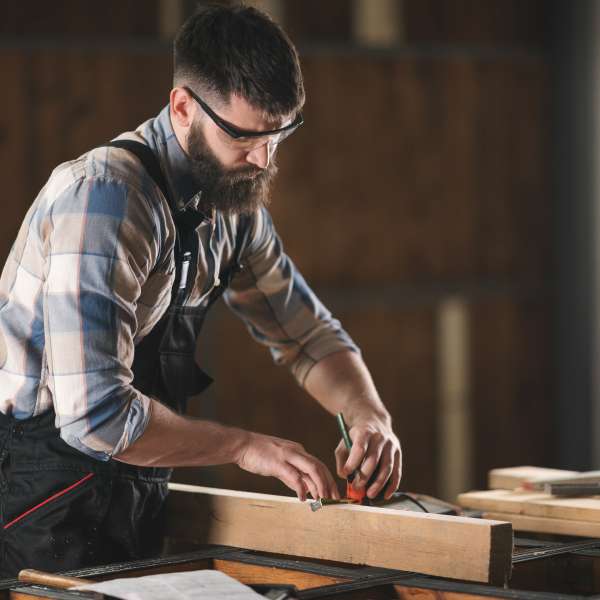
Carpentry can be an exciting career choice for someone who enjoys creating things with their hands. For those with exceptional woodworking skills, joinery could be the specialty for you. This type of finish carpentry requires steady hands and keen attention to detail to create everything from furniture to flooring.
Joinery apprenticeships can provide you with paid on-the-job experience in the art of joinery. These apprenticeships follow a long tradition of learning a craft under a more experienced tradesperson, but they have become more formalized in recent history. To become a “master” joiner, you will need to complete a carpentry or joinery apprenticeship that is approved by a trade union and your state or local government.
What is joinery?
Joinery is a specialized type of carpentry that focuses on joining two pieces of wood. This may sound basic, but joinery is often very complex. While some joinery projects do use glue and nails to marry pieces of timber together, many use only intricate woodworking techniques and heat to do the job.
An experienced joiner uses their skills and knowledge on projects as varied as cabinets, bookshelves and furniture, windows and doors, staircases, floors, and skirting boards. Because joinery is considered a form of finish carpentry, your work must be clean and precise (unlike rough carpentry, which is not meant to be seen).
Who can become a joinery apprentice?
You will need to meet specific requirements to become an apprentice joiner in the United States. These requirements vary from state to state, but generally, you will need to:
- Be at least 18 years old
- Graduate high school or earn a GED
- Pass a qualification exam that tests your basic math and measuring skills
- Be able to work legally in the United States
You may be required to join a trade union to enroll in any joinery apprenticeships they offer. The union will provide you with information on its rules and benefits, and they should guide you through the process of joining their organization.
What is a joinery apprenticeship like?
Apprentice joiners learn carpentry skills through a combination of classroom instruction and hands-on workplace training. It usually takes three to four years to complete a joinery apprenticeship if you are putting in full-time hours (it will obviously take longer if you are only working at it part-time).
During your joinery apprenticeship, you will learn skills of the trade, such as:
- The qualities of different types of wood
- Basic to advanced joinery techniques
- Freehand design sketching
- Reading building plans and blueprints
- Green building techniques
- Construction safety
- Handling and disposal of hazardous materials
Classroom instruction typically covers different carpentry methods, how to read blueprints, and safety procedures. These skills will then be put to the test through on-the-job experience, where you will be supervised by an experienced joiner or carpenter.
A major perk of an apprenticeship is that you are paid to learn your craft. This could help you support yourself while learning the trade, and you will not need to repay student loans once you begin work as a professional joiner.
Finding a Joinery Apprenticeship
Like general carpentry apprentices, joinery apprentices can find trade apprenticeship programs in a variety of ways.
- Carpentry unions – Aspiring joiners can apply for apprenticeships through national or independent regional unions. The United Brotherhood of Carpenters and the Laborers’ International Union of North America are the largest carpentry unions in the United States.
- Online job boards – Joinery apprenticeships may be advertised on online job search sites and message boards in the “on-the-job training” or “apprenticeship” categories.
- Personal network – It never hurts to ask your personal network for help finding an apprenticeship! Family and friends may be able to introduce you to professional joiners in need of apprentices.
Applying for a joinery apprenticeship is like applying for any other job. Take your time filling out the application and dress nicely for the interview. If you present yourself professionally, it shows that you are serious about becoming an apprentice joiner and are likely ready to put in the hard work and hours necessary to complete the program.
Do joiners need insurance?
After completing your joinery apprenticeship, you will be considered a professional joiner. You will be eligible to become a licensed carpenter and may need to apply for a carpentry license depending on your state or local government’s rules.
You may be required to have different types of business insurance to apply for a license. General Liability insurance and Workers’ Compensation coverage are often mandatory for skilled tradespeople and contractors.
Even if insurance is not mandated for joiners in your area, you might still consider getting covered. Business insurance helps protect you from common risks. Needing to replace stolen tools, accidentally damaging a customer’s property, and workplace injuries can all be expensive. Insurance policies for small business owners are designed to cover the costs of these and other events, so you don’t have to.
Cutting a Clear Career Path
Becoming an apprentice joiner is a convenient and popular way of starting a career in carpentry. Through many hours of study and hands-on experience, you will learn an in-demand trade that could help you start a successful small business. If you are interested in joinery apprenticeships, search the requirements In your area to see if you qualify.
Learn more about carpentry business insurance with BizInsure. We’re proud to help joiners across the country find coverage that fits their small business needs.



